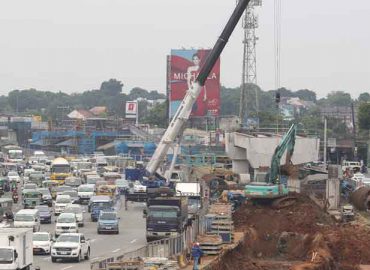.
By Bernadette D. Nicolas, September 10 2018; Business Mirror
https://businessmirror.com.ph/cost-of-shifting-to-federalism-only-p17-6b-con-com-twg/
Image Credit to Inquirer.net
THE total direct additional cost of shifting to federalism will amount to P17.567 billion, a figure way below earlier estimates by economists and certain groups.
The P17-billion tab was revealed by Wendell Tamayo, head of the technical working group (TWG) of the Consultative Committee (Con-com), in a recent forum.
Tamayo’s estimate on the cost comes more than a week after the Con-com and the Economic Development Cluster met to compare figures on the cost of shift to federalism.
Although there is additional cost, Tamayo stood firm that the government will have savings once the country shifts to federalism.
“The federal government which is very bloated will go on a diet because the regions will transfer functions, personnel, assets and will start to build up their own capacity but based within the cash revenues given to them under the federal system,” he said.
However, he said it is the role of the Department of Budget and Management (DBM) to look into the P17.5 billion additional cost vis-a-vis the savings, even as he noted that collapsing into one the separate electoral tribunals, as proposed by Con-com, will result in savings.
“It is the management side of DBM that will look at how this will evolve and it is the individual agencies who will prepare and assess their own capacities on how they will comply with the constitutional requirements for noncentralization of functions,” Tamayo added.
Con-com’s estimate
Earlier, Con-com said the estimated total incremental cost directly attributed to federalism features would only amount to P13.29 billion, way below what was computed by the National Economic and Development Authority—with estimates as low as P156 billion to as high as P243 billion.
Con-com’s earlier computation of P13.29 billion excludes the computation for additional courts and additional constitutional commissioners since the only ones considered were those directly attributed to federalism features, meaning, those that are necessary for the country to shift to federalism.
Putting up additional courts and additional constitutional commissioners are considered “improvements” of the current setup.
According to a separate computation made by Tamayo, the P17.5 billion in additional cost already includes the tab for setting up three new high courts and additional commissioners and staff for the constitutional commissions, particularly in the Commission on Audit (COA)and the Federal Ombudsman Commission.
In its proposal, the Con-com is adding two constitutional commissioners who are experts on quality control and management under the Commission on Audit. There will be four additional Associate Ombudsmen for the Federal Ombudsman Commission.
Of the total P17.5 billion in additional cost, P2.807 billion will go to the additional court justices and their staff for the Federal Constitutional Court, Federal Administrative Court and Federal Electoral Tribunal.
In other words, each additional court with nine justices and their staff as proposed by Con-com—in a bid to speed up the resolution of cases—will cost about P900 million each.
Although the Con-com is proposing four new high courts, including the Federal Supreme Court, Tamayo excluded the cost for the Federal Supreme Court since it is not classified as an additional cost, being already in the current setup.
The salaries of additional constitutional commissioners and their staff for the COA and Federal Ombudsman Commission will incur a cost of P1.8 billion.
Although the Con-com is proposing to add the Commission on Human Rights and the Philippine Competition Commission to the list of constitutional commissions, Tamayo excluded these commissions from the computation since these already exist in the present setup.
Besides the COA, the other current constitutional commissions listed in the 1987 Constitution were the Civil Service Commission and the Commission on Elections.
Notably, the bulk of the additional cost of P17 billion will go to the salaries of additional federal legislators (12 senators and 108 congressmen), their staff and the operating expenses of their offices, which will amount to P7.66 billion.
The 15-man Federal Intergovernmental Commission, which will administer the equalization fund for those regions in need, will cost the federal government an additional P300 million, covering the salaries of its appointive members and the group’s operating cost.
Meanwhile, the second-biggest item funded from the P17 billion will go to the direct new cost of having 17 federated regions.
Although Con-com is proposing a total of 18 federated regions, Tamayo excluded from the computation the Bangsamoro region since there is already an existing government for the Autonomous Region in Muslim Mindanao.
Tamayo said P5 billion will be composed of salaries of regional governors and deputy regional governors, estimated operating expenses of offices of the Federal Regional Executive Government (P3.3 billion) and the salaries of Regional Assembly members, their staff and operating expenses of offices (P1.7 billion).
Earlier, the Con-com said it was “willing to reconcile” its position with other government agencies.
Con-com Chairman and retired Chief Justice Reynato S. Puno told the BusinessMirror they also asked for time to respond in writing to the areas of concern on the draft Charter raised during the Economic Development Cluster meeting.

